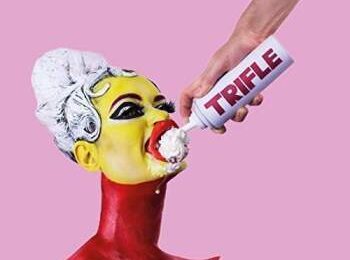It should be noted (for the millionth time) that one of the primary directives of mainstream pop music is to GENERATE IMMEDIATE AFFECT, and in pop music’s case it is almost always that of the sensation of pleasure. Everything, from the singing, to the videos, clothing, music, lyrics, and photoshoots displaying beautiful, shiny people, teases the fan in a way that achieves instant arousal and gratification. Any rough edges or messy bits need to be excised to avoid any unwanted disruption. But there’s always been an evil twin, a dark, fleshy underbelly, to pop music that consistently threatens to burst like a blister, spreading its multicoloured sleaze over such good-natured wholesome fun. Music made by freaks and deviants of all kinds, to remind us that there are more mores, tastes and pleasures than white vanilla.
Lone Taxidermist, the brainchild of Cumbrian exile Natalie Sharp along with Philip Winter and Will Kwerk, have made a debut album that forsakes teasing and coo, instead preferring to don rubber gloves and let it all hang out before thrusting it in your face and laughing maniacally with mouthed covered in smeared lipstick.
Despite the raucous nature of the band, there is a sense of calm professionalism at play on Trifle. With many of the songs gestating over the last few years, there’s no slack here at all. They are direct and to-the-point leftfield pop. There are still moments where the grit and grime scuff things up; songs such as ‘Knicker Elastic’, ‘Bijoux Boy’, and ‘Mr Coral’ are a continuation of the post-punk awkward-pop from The Slits, Delta 5, The Raincoats et al. Then there is another side to the album which displays their love of disco, synth pop and various electroclash: ‘Cornflakes’, ‘When the Water’s Cold’ and the wonderfully titled ‘Hammered in Homebase’, are all garish synths, wonky rhythms and pumping electro bass.
But while the music is all DIY synth-pop speckled with flecks of brittle post-punk deconstruction, what marks Lone Taxidermist out among their contemporaries is Sharp herself. Throughout Trifle she is strident and brazen, sometimes a bit wayward but always unabashed in her delivery. An unholy amalgamation of Grace Jones, Ari Up and John Cooper Clarke, her vocal styles veer all over the place from stream of consciousness poetry in her Cambrian drawl to diva-esque wails and jarring harmonies.
And then there’s the world that Sharp and her bandmates conjure up with their imagination. The songs in Trifle are like a peeper’s eye view of gutter glamour on the prowl: chaotic nights, overindulgence, bad sex, and the sharp jolt of getting home the day after when you’ve lost your travelcard. All this is sung with glee by Sharp; when she informs you that “Little does he know there’s a crime scene in my pants”, you can safely bet she’s not using symbolic allegory. Such tales of tack and grime are interwoven with some moments of dark surrealism, such as coming across dead bodies on rubbish tips, or encountering bizarre figures describes in ‘Dribble Wizard’ and ‘Mr Coral’.
This love for the mucky and soiled informs other aspects of Lone Taxidermist, in that Trifle is not so much a collection of songs as it is an all-round collective visual experience. Using their bodies as a canvas for all manner of painting, costume and performance art, Lone Taxidermist pack a visual spectacle to accompany the album’s music. The live shows and videos are a messy explosion of garish make-up, clashing colours and outfits made of various rubbery plastics and a different take on latex fetish outfits. Sharp has a clear fascination with the human body and all the fun and grotesqueness that entails. The videos accompanying Trifle show the band revelling as they take great pleasure in dressing up in glitter and rhinestones, as well as outright food porn. (One shot in the video trailer for the album has jelly literally ejaculate onto Sharp’s face as if someone was popping a nasty boil.) Everything is covered in a shiny, slimy and sticky veneer that find its way into all those deep crevices.
While Trifle is an album that delivers squelchy, cheeky fun and frolics on a budget, its take on sexy pop times is more honest and refreshing than much of the overwrought earnestness that passes for ‘fun’ popular music. What makes it especially powerful as a pop record is not its brashness or its queerness (and there’s plenty of that), but that it displays no hint of fear, hesitation or subtext. It lays out all the messy entanglements of fun, sex and pleasure, and invites you to come on in and put some rubber gloves on.



